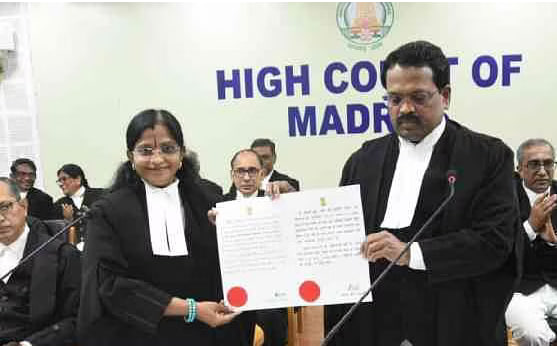Bench and bigotry : On advocate Victoria Gowri’s appointment as Madras High Court judge
A judge’s appointment exposes the opaque Collegium-system
The questionable elevation of advocate L. Victoria Gowri as a judge of the Madras High Court epitomises the problematic nature of the system of judicial appointment. It also portends a government-driven project to take-over the Bench through its favourites. Ms. Gowri, whose unabashed prejudice against minorities became evident when her past speeches and interviews came-to light after her name was approved by the Supreme Court, was sworn-in at an oath -taking ceremony organised with great dispatch . Earlier, the Union Law Ministry ad processed the recommendation concerning a set of candidates with extraordinary speed not displayed in other cases . It was clear that the government wanted to act ahead-of any possible interim order from the Court, which had agreed to hear petitions from a group of lawyers against her appointment. In the process, the government ignored a specific recommendation that R. John Sathyan, an advocate whose candidature was earlier opposed by the Ministry, be appointed first. It is a clear message that the present regime would pick-and-choose among those approved by the collegium, in a manner informed by its political preferences . That the government repeatedly has.its-way indicates that the conflict over the appointment process has reached a stage in which the collegium is constantly under pressure to yield to the executive’s position on individuals if any meaningful progress is to be made on the perennial process of filling up vacancies.
The challenge to Ms. Gowri’s appointment was on the ground that Had there been effective consultation and relevant information placed before the collegium, her appointment may not have materialized . Further, by her speeches denouncing Christians and Muslims she had rendered herself ineligible to act without-fear or favour; and that she could not be expected to dispense justice without discrimination “on the ground of religion...”. However, the Bench rightly rejected the petitions, observing that it cannot revisit the suitability of any appointee after the collegium had decided on it. The Court on the judicial side could not possibly have gone-into a choice made by its top three judges. Indeed , it made no sense to refer the collegium’s decision to a Bench for review. It is apparent that the State government too had not flagged her extreme views. While political affiliation should not disqualify anyone from judicial office, open bigotry ought-to . It is also a signal failure of the collegium process that a controversial proposal could get-past its scrutiny . What is needed is more than reform in the appointment system: perhaps, a process that combines an objective evaluation of the candidates’ credentials with an independent mechanism that ensures public scrutiny of their suitability. What is in place at present is an opaque, closed-door consensus-building that could leave room for unhealthy compromises .
